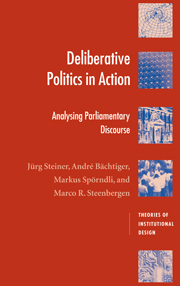Book contents
- Frontmatter
- Contents
- Acknowledgments
- Introduction: The research questions
- 1 Institutions and behavior: the example of consociational theory
- 2 The philosophical literature on deliberative politics
- 3 Measuring deliberation: a Discourse Quality Index
- 4 Understanding the real world of deliberation: hypotheses about antecedents and consequences
- 5 Antecedents of deliberation: institutions and issues
- 6 Discourse and its consequences
- Conclusion and research outlook
- Appendix: Discourse Quality Index (DQI): instructions for coders
- References
- Index
Conclusion and research outlook
Published online by Cambridge University Press: 22 September 2009
- Frontmatter
- Contents
- Acknowledgments
- Introduction: The research questions
- 1 Institutions and behavior: the example of consociational theory
- 2 The philosophical literature on deliberative politics
- 3 Measuring deliberation: a Discourse Quality Index
- 4 Understanding the real world of deliberation: hypotheses about antecedents and consequences
- 5 Antecedents of deliberation: institutions and issues
- 6 Discourse and its consequences
- Conclusion and research outlook
- Appendix: Discourse Quality Index (DQI): instructions for coders
- References
- Index
Summary
To our knowledge, ours is the first attempt to submit a measure of the level of deliberation to reliability tests. Since these tests proved to be successful, we were able to establish systematic variation in the discourse quality. Successful reliability tests, of course, do not automatically mean that the measure is valid. Does our Discourse Quality Index (DQI) really tap into the philosophical concept of deliberation? The answer would have been negative if we had been unable to explain the variation in the discourse quality in its preconditions and consequences in a theoretically meaningful way. As chapters 5 and 6 demonstrate, however, variables linked to the deliberative literature helped us to explain it to a large extent. The validity of a measure is always most difficult to prove in a final way, and we do not claim that we are absolutely sure that our DQI measures what philosophers understand by deliberation, but we are at least encouraged that we are on the right path.
Our results show that discourse quality is not a uni-dimensional phenomenon but a complex cluster of elements. If actors justify their arguments in the sense of the deliberative model in a sophisticated way, this does not always mean, for example, that they show respect for the arguments of other actors, another aspect of the deliberative model. This meant for our empirical analyses that quite often we had to break down the DQI into its individual elements.
- Type
- Chapter
- Information
- Deliberative Politics in ActionAnalyzing Parliamentary Discourse, pp. 165 - 169Publisher: Cambridge University PressPrint publication year: 2005



